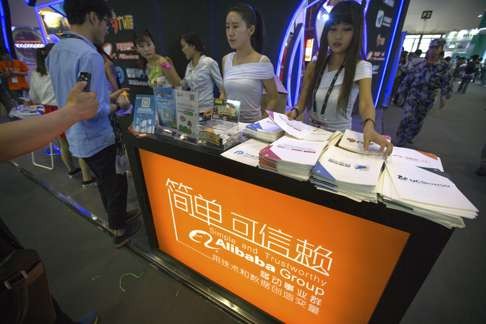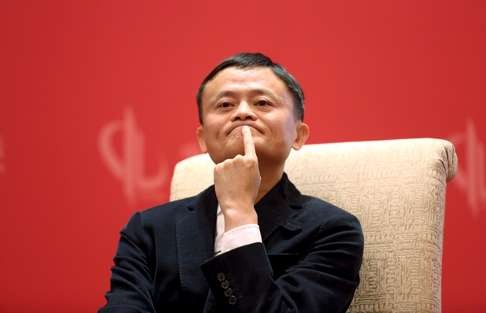
E-commerce giant Alibaba maintains confidence in accounting practices amid US regulatory probe

With the reputation and shares of the company under siege, Alibaba Group executive vice-chairman Joseph Tsai yesterday took the high ground and expressed confidence in the firm’s accounting practices, which are being investigated by the United States Securities and Exchange Commission (SEC).
New York-listed Alibaba, the world’s largest e-commerce services company, saw its share price fall 6.8 per cent to US$75.59 in US trading on Wednesday -- its steepest drop since January -- on news of the SEC probe that the company disclosed in its regulatory filing this week.
“Overnight, the market did not react well in what I believe to be an overreaction to headline news,” Tsai told the South China Morning Post, which the Hangzhou-based company owns.
In its 20-F filing on Tuesday in the US, Alibaba said the SEC informed it was initiating an investigation into whether there have been any violations of the federal securities laws.
Alibaba was requested to voluntarily provide the SEC with documents and information relating to: consolidation policies and practices, including accounting for Cainiao Network as a so-called equity method investee; its policies and practices applicable to related party transactions in general; and reporting of operating data from China’s “Singles Day”, the world’s biggest online shopping festival held every November 11.
“On the substantive topics in the SEC inquiry, we are confident of our accounting for consolidation, and of our robust and transparent disclosures in our 20-F and March quarterly earnings about major equity-method investees, such as Cainiao and Koubei, as well as related party transactions,” Tsai said.
Cainiao, which is is 47-per cent-owned by Alibaba, runs a logistics data platform that links the e-commerce giant’s information and those of its logistics service providers. Koubei is the online-to-offline, daily deals joint venture that Alibaba established with affiliate Ant Financial Services Group, which operates online payment platform Alipay.
According to the Alibaba filing, the SEC said its request for information did not indicate that any violation of federal securities laws has occurred.
“We believe the SEC initiated this matter because of the public noise starting from last year created by a research firm used by short-sellers, Pacific Square Research, and short-sellers such as Jim Chanos,” Tsai said.

Pacific Square Research managing partner Herb Greenberg criticised the complicated nature of Alibaba’s accounting practices in an interview with CNBC last September. Greenberg suggested that Alibaba’s investments into smaller companies could be reported as expenses, which would serve to inflate profits.
Noted short-seller James Chanos, the founder of Kynikos Associates, had also questioned Alibaba’s accounting metrics and cash flow. “We just don’t see how profitable or unprofitable” Alibaba’s business is, Chanos told CNBC last year.
Alibaba earlier this month reported a 193 per cent jump in net profit to 71.29 billion yuan (HK$84.39 billion) in the 12 months to March, up from 24.32 billion yuan in its previous fiscal year.
Total revenue climbed 33 per cent to 101.14 billion yuan, up from 76.2 billion yuan the previous fiscal year, on the back of a record gross merchandise volume (GMV) -- the total value of goods sold on its domestic e-commerce platforms -- of 3.09 trillion yuan in the fiscal year to March.
“We believe it is still difficult for US generalist investors to grasp the massive numbers on Singles Day because they under-appreciate the potential purchasing power of Chinese consumers and the prevalence of mobile commerce in China,” Tsai said.

Paul Haswell, a partner at international law firm Pinsent Masons, said Alibaba has been having “a rough ride” from US investors, who have many questions about the company’s operations. “That won’t change regardless of the outcome of the SEC investigation,” Haswell said.
Deutsche Bank research analyst Alan Hellawell pointed out that investigations are sometimes launched “because the SEC is unfamiliar with various constructs”, such as Cainiao’s business model and the unprecedented scale of Singles Day.
Gartner analyst Sandy Shen pointed out that companies use different ways to account for revenue.
“In e-commerce, GMV is a common metric tracked by businesses and investors. Alibaba, JD.com and eBay include all transactions in the GMV, regardless of whether the order is cancelled or returned,” Shen said.
“Amazon doesn’t use GMV, but net sales which include purchases over its own platforms, and service fees from third-party merchants selling over its platform. This can make Amazon’s number much smaller since Alibaba and others account for all the merchant sales going through their platforms.”
In a research note, Morgan Stanley analysts said a few investors have raised concerns and have been publicly vocal about the accounting treatment of Cainiao.
“We believe these investors have a misunderstanding about China’s express industry and the role of Cainiao in the logistics value chain,” they said. “We are incrementally more positive on Alibaba given its increased transparency and disclosures on Cainiao and other related parties.”
On the inquiry about related-party transactions, HSBC analyst Tsang Chi said in a research note that the SEC is “reviewing Alibaba’s procedures and policies in general and not investigating any particular deal”.
Deutsche Bank's Hellawell said Alibaba has made many investments in the past few years, which may have significantly driven the SEC request for clarification around disclosure policies and practices. "We believe the company has struck a clear set of definitions around materiality with its auditors, but have little visibility as to what exactly the SEC in interested in on this front," he said.
Rob Sanderson, managing director at MKM Partners, said media reports with "SEC investigation" headlines have played directly into investor concerns for most emerging market companies. "We think this has excessively pressured Alibaba's shares and is creating a buying opportunity," Sanderson said.
Reports from analysts at Nomura, Deutsche Bank, Morgan Stanley, HSBC, MKM Partners and SunTrust Robinson Humphrey all maintained their “buy” rating on Alibaba shares.
The SEC had also investigated Alibaba in January last year related to a State Administration of Industry and Commerce “white paper”, which accused the company of knowingly selling fake goods and other illegal activities. This investigation ended in September with no enforcement action, according to HSBC's Tsang.